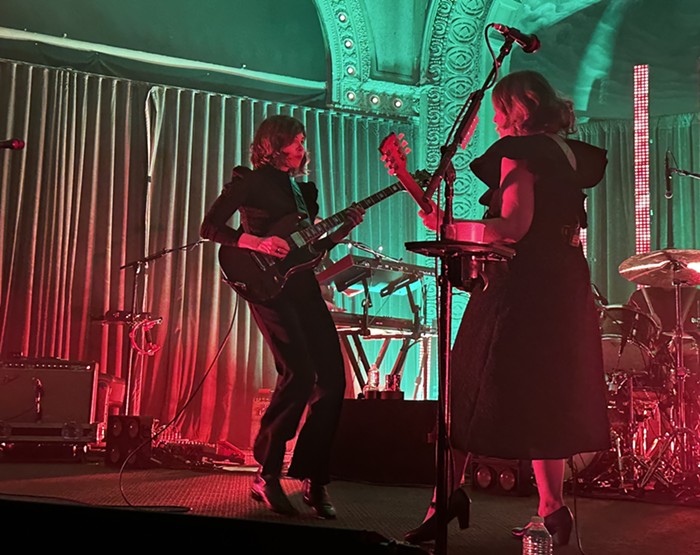In a year full of Portland bands breaking through to the national level, no one else captured the hearts—and iPod playlists—of rock fans quite like Blitzen Trapper.
Their self-released third album, Wild Mountain Nation, uprooted the band's sound from its familiar terrain of fragmentary lo-fi and relocated it to a land where breezy folk, blistering country rock, and the occasional synthesizer breakdown made for friendly neighbors. The sleepy harmonies on "Futures & Folly" and "Summer Town" were hitched to Big Star-style acoustic pop formulas. In-the-red rave-ups like "Devil's a-Go-Go" and "Murder Babe" alternated between shambling and mathematically precise, as cooing melodies cut through distorted electric guitar duels. The epic title track surged with the kind of classic rock licks not heard since Neil Young and the Allman Brothers owned the airwaves. And throughout the album, harmonica and banjo jams bubbled up in interludes—even in the middle of otherwise straight-ahead rock songs. These impromptu hoedowns gave Nation something of a split personality. On one side of the fence, there was the city-dwelling Blitzen Trapper: a band of pop-savvy tunesmiths, armed with stomp boxes and synthesizers. And on the other side, there was the backwoods Blitzen: a pack of shirtless rubes, plucking banjos and chewing tobacco for an audience of tumbleweeds and cacti.
In all, the album charmed the socks off bloggers, led to a record deal with Sub Pop, and even received that most coveted stamp of approval, Pitchfork's "Best New Music" designation. For the past two months, Blitzen Trapper has been expanding its empire, annexing more territory for the Wild Mountain Nation with a tour of Europe.
"These Euro crowds are amazingly receptive and open," says singer and songwriter Eric Earley by email. "They seem to love music in a refreshingly genuine way."
Now that the band is back home, their attention has turned toward putting the finishing touches on the follow-up to Nation. According to Earley, the new album is a few details shy of completion and represents another significant step forward for the band. Although he was reluctant to articulate how the new material differs from their previous work, he assured fans that they could expect it to further diversify Blitzen Trapper's rapidly evolving sound.
"The new record is much different from Nation; it covers more ground," he explains. "Nation was a record that I spent a month or two writing and recording. It just sort of happened. I don't second guess that kind of record."
Blitzen Trapper has earned a well-deserved reputation for its prolific output by regularly posting unreleased material on its website. And when the band teased labels and media with a sampler of songs from the album that would become Nation, not one of those six songs actually made it onto the album. Still, Earley's description of the album's short gestation rings true. Nation sounds like it was recorded in a very condensed time span, a product of an intense creative burst. Certainly, such an accelerated working style can be partly attributed to the band's working method. Blitzen Trapper records at home on four-track tape, allowing the band to preserve everything from fleeting song ideas to spontaneous experiments. No wonder, then, the new record is already in the can. Not that the band are curmudgeonly technophobes. If they have always employed analog equipment to make its music, Earley insists the decision is not out of stubborn loyalty.
"I don't feel committed to anything but what sounds good to me," he says. "I still haven't heard a computer-recorded rhythm section that felt real to me, so I guess I continue with tape for certain things. But I definitely use a mix of recording techniques and media."
Regardless of how the band makes its music, one question remains: What, where, or who is the Wild Mountain Nation? Is it an outlaw attitude toward music that uproots fences and trespasses genre boundaries? Is it a stretch of shacks in the heart of the Appalachian Mountains? Is it a ramshackle union of front porch fiddlers and basement amplifier arsonists?
"It's everybody who chooses to love creation, instead of control it; who decides to learn from the past, but live in this now," Earley says. "There's a certain amount of losing the world in order to gain life. And I don't really acknowledge human differences on a nationalistic level. I don't believe in USA, Europa, etc.—just people."


















